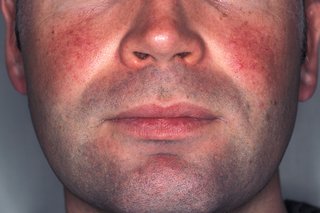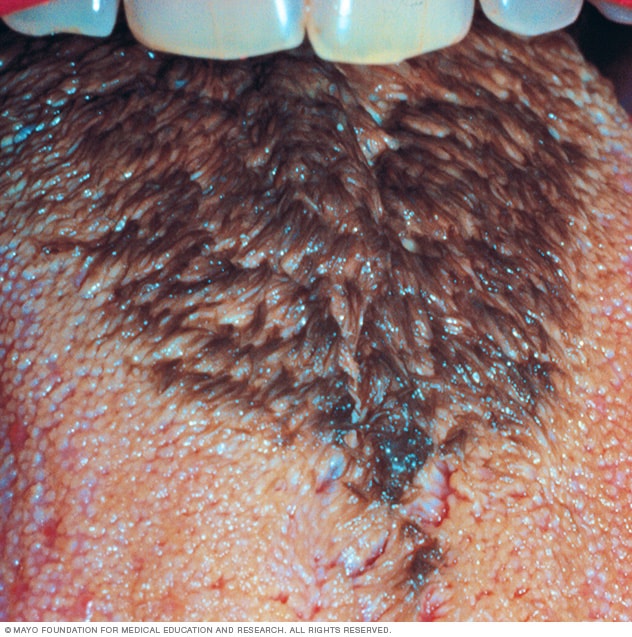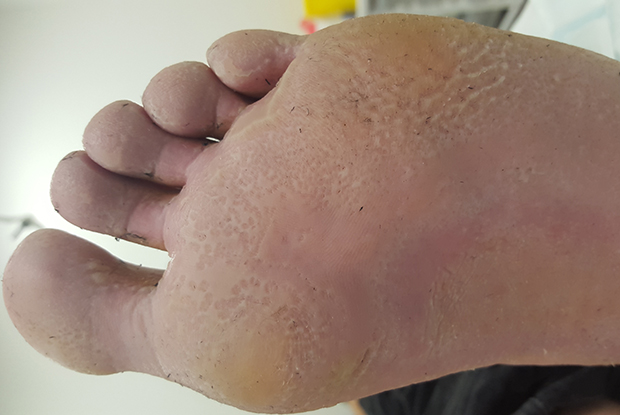A 64 yo man is evaluated for a 3 day history of fevers, chills, and cough with yellow-green sputum. Although his breathing is comfortable at rest, he feels short of breath with minimal activity. PMH significant for COPD, T2DM, and 50 pack year smoking history (although he quit 5 years ago). Meds include metformin, tiotropium and PRN albuterol. UTD on flu vaccination.
On exam: temp 37.6, BP 130/90, HR 90, RR 24. Oxygen saturation 92% on room air. He has diffusely decreased breath sounds throughout and crackles at the right lung base; occasional mild expiratory wheezes are present. Cardiac and abd exams are normal. CXR shows RLL infiltrate.
What is the most appropriate treatment and where should this treatment occur?
What is outpatient treatment with Levofloxacin or Augmentin + azithromycin(preferred)/doxycycline?
A 57 yo woman is evaluated during a pre-op visit for a total L knee replacement. PMHx: osteoarthritis. Meds: Ibuprofen (takes multiple times per day)
Exam with BP 152/90, HR 64. BMI 34. Severe osteoarthritic changes are noted of L knee. Trace pitting edema noted. Remainder of exam is unremarkable.
Labs show Cr of 1.2, K 5.1, and urine dipstick with no blood or protein
What is the next step in management of this patient's blood pressure?
What is discontinue NSAIDs?
A 41 yo man is evaluated because of his "red face". He notices that his face gets redder when he goes out in the sun, gets out of the shower, or drinks hot coffee. he is most bothered by the pimples he gets on his cheeks and chin. His skin is not itchy or painful. He takes no medications, drinks 3-4 beers on the weekend, and otherwise feels well. General physician exam is unremarkable. Skin findings are shown.

What is the most likely diagnosis?
What is rosacea?
A 27 yo woman comes to the office to discuss medications 3 days after experiencing a first seizures. MRI on the day of the seizure showed L mesial temporal sclerosis and a subsequent EEG was significant for temporal sharp waves, findings consistent with temporal lobe epilepsy. She has PCOS and requires a daily estrogen-progestin combination for symptoms management and contraception.
Exam, including vital signs, are normal.
What is the most appropriate antiepileptic to start this patient on?
What is Levetiracetam (Keppra)?
A 45 yo man is evaluated for R sided chest discomfort and cough x 2 weeks. His chest discomfort is described as vague, painful sensation on the right. No hemopytsis or SOB. he has felt feverish with mild fatigue but no weight loss. He is a smoker with 20 pack year history. He takes no medications.
On exam, temp is 37.6, BP 130/70, HR 86, RR 18. BMI 27. Pulse ox 98% on room air. Exam, including chest, is unremarkable. No rash is present.
CXR shows a nodule in the RLL, which CT of chest confirms. CT guided biopsy was performed. Findings on histologic testing are + for budding yeast and culture indicates Cryptococcus neoformans. HIV test negative.
What is the most appropriate management?
What is lumbar puncture?
A 53 yo woman is evaluated during a routine visit. PMH significant for HTN and chronic active Hep B infection. Her Hep B infection has been treated with tenofovir for the past 5 years with suppression of her serum hepatitis B DNA levels. She currently notes mild generalized weakness but otherwise feels well. Meds include tenofovir and ramipril.
Exam: temp 37.0, BP 136/79, HR 70, RR 14. BMI 22. Abd exam with normal sized liver and no splenomegaly. Remainder of exam is normal.
Labs:
bicarb 21
creatinine 1.2 (0.8 3 years ago)
glucose 87
phosphorus 2.2
UA with 1+ protein, 2+ glucose, and no cells or casts
What is the most likely cause of this patient's kidney findings?
What is tubulointerstitial disease?
A 72 year old man is evaluated for discoloration of the tongue and bad breath. He notes the gradual onset of the tongue changes, with development of significant halitosis in recent weeks. He otherwise feels well and has no other symptoms. PMH is unremarkable. He smokes 1/2 pack of cigarettes per day and drinks 2-3 glasses of wine each night. He takes no meds.
On exam, he is afebrile and vital signs are normal. Tongue shown below.

Dentition is poor but there are no other lesions in the oral cavity. There is no lymphadenopathy in the head or neck. The remainder of exam is unremarkable.
What is the most appropriate management?
What is brushing of the tongue?
A 72 yo man is evaluated for 1 year history of progressively impaired gait and balance. He reports that he walks more slowly and is not as agile as he used to be, attributing a recently increased number of falls to not paying enough attention before tripping. In the past 6 months, he has had occasional problems recalling details of recent conversations and events, organizing his checkbook despite being an account before retiring. He also reports some urinary urgency and frequency but otherwise feels well. He has HTN treated with HCTZ and no h/o TBI, meningitis, or ICH.
On exam, vitals are normal. General medical exam is unremarkable. On neuro exam, gait is slow, with poor foot clearance, shuffling, multistep turns, and intermittent hesitation. Tandem gait is impaired. He scores 23/30 on Mini-mental state exam with points deducted on the delayed recall and serial 7 calculation sections. MRI of the brain is shown.

What is the most appropriate next step in management?
What is large-volume lumbar puncture?
A 68 yo woman is admitted to the hospital for a 2 day history of fever, increasing dyspnea, and worsening cough. She was dx with influenza pneumonia 3 weeks ago. She was beginning to recover when her current symptoms began. Her cough, which had almost resolved, returned with grey-colored sputum. PMH of HTN. Only medication is HCTZ.
On exam, temp 38.1, BP 136/82, HR 89, RR 28. Oxygen saturation is 90% on room air. Lung exam shows diffuse rhonchi. Cardiac and abdominal exams are normal.
CXR shows bilateral cavitary infiltrates.
What is the most likely causative pathogen in this patient?
What is Staphylococcus aureus?
A 58 yo woman is evaluated during a follow up visit for a 5 year history of stage 3b CKD caused by analgesic nephropathy. PMH also includes HTN. Exam shows BP 132/78, HR 82, RR 14. BMI is 26. Cardiac exam with no murmur, rubs, or gallop. The lungs are clear.
Labs:
Cr 1.8
Na 140
K 5.4
Cl 110
bicarb 18
pH 7.36; PCO2 35
EFR 33
What is the most appropriate treatment?
What is sodium bicarbonate?
A 52 yo woman had a burning sensation involving the R side of her forehead and the tip of her nose x 2 days, followed by increased redness and development of lesions involving the tip of her nose. PMH significant for HTN, and her only medication is lisinopril.
On exam, vital signs are normal. Skin examination shows an erythematous patch on the right side of the forehead with scattered overlying grouped vesicles and a vesicle on the tip of the nose with background erythema. Mild conjunctival erythema is noted. Remainder of exam is unremarkable.
In addition to starting antiviral medications, what is the most appropriate next step in management?
What is urgent ophthalmologic evaluation?
A 27 yo female is evaluated for severe migraine with typical aura and R sided sensory symptoms that occurred 1 day ago. Migraine was dx at 13 yo, is often preceded by 45 minutes of vision loss (which she describes as "losing half my sight"), is only associated with onset of menses, involves hemicranial throbbing pain with n/v, and last 90 minutes if treated and 24 hours if untreated. Yesterday's migraine was similar to previous except that she had numbness and parasthesia in the R upper arm. These symptoms lasted for 50 minutes and then resolved completely. She has no recurrence of her symptoms in the past 24 hours. Medications include rizatriptan and combined estrogen-progesterone OCP.
On exam, BP is 122/72, HR 66. all other exam findings, including those from a neuro exam, are unremarkable.
Findings on brain MRI and MRA are normal.
What is the most appropriate first step in management?
What is discontinue her combined oral contraceptive?
A 39 yo man undergoes consultation about HIV prevention. he has a male partner with HIV infection. He reports they use condoms "most of the time". He asks about other options that can reduce his risk of acquiring HIV from his partner. He is asymptomatic. Medical history is noncontributory and is on no medications.
Exam, vitals signs are normal.
Results of testing for HIV are negative. Hepatitis B surface antigen negative; Hep B surface antibody positive.
What is the most appropriate next step in management?
What is provide PrEP (tenofovir-emtricitabine)?
A 35 yo man is evaluated in the ED for dyspnea for 24 hours. He also reports progressive lower extremity edema for 1 month. he has no other pertinent personal or family medical history, and he takes no medications.
Exam: afebrile, BP 120/78, HR 100, RR 22. Oxygen saturation is 88% on room air. The chest is clear. Exam of the heart is unremarkable. There is bilateral lower extremity pitting edema to the knees. The remainder of exam is unremarkable.
Labs:
Albumin 1.8
Cr 1.1
UA: negative for blood, 3+ protein; no cells
Urine protein-Cr ratio 5500
CXR is normal. CTA of the chest shows a R pulmonary artery embolism. He is started on supplemental oxygen and heparin.
What is the most likely underlying diagnosis?
What is membranous glomerulopathy?
A 24 yo woman with longstanding atopic dermatitis is evaluated for an acute worsening of her disease in the past week. She has had increased pruritus and had multiple painful areas within the involved skin. She had been applying petrolatum jelly and triamcinolone ointment and washing with gentle cleansers prior to worsening of symptoms. She was recently started on Cephalexin and topical mupirocin without improvement in her symptoms. Her lesions have spread and are now painful.
Exam: Normal vital signs. She has eczematous plaques with scattered vesicles and punched out erosions within the involved areas. The remainder of the physical exam is unremarkable.
What is the most likely cause of this patient's acute flare?
What is herpes simples virus infection?
A 41 yo man is evaluated for 1 week history of severe, recurrent, L periorbital headaches. He has experienced a 10-12 week period of similar headaches every spring for the past 3 years. Headaches occur 1-2 times daily, last 2-3 hours if untreated, and are accompanied by nausea, photophobia, and ipsilateral tearing but no aura or vomiting. Resting during headache episodes brings no relief; he instead paces the floor. Simple analgesics and prednisone have been ineffective in treating the headache. Although subcutaneous sumatriptan generally relieves symptoms within 5-10 minutes, his headache frequency and dosing limitations preclude his using this drug every time he has symptoms. The patient has a 20 pack year history of smoking. He takes no other medication.
On exam, BP is 134/82, HR 78. All other physical exam findings, including neuro exam, are unremarkable.
What is the most appropriate next step?
What is verapamil?
A 24 yo woman is hospitalized for a 1 month history of increasing paranoia and delusions according to her husband. On the day of admission, she had a tonic-clonic seizure with incontinence. Medical history is otherwise unremarkable and she takes no medications.
On exam, temp is 37.9, BP 107/48, HR 102, RR 16. The patient is unresponsive but withdraws her extremities to painful stimuli. The neck is supple to passive flexion. Occasionally, choreoathetoid movements of the bilateral upper extremities are observed.
LP performed with CSF studies:
WBC 57; 97% lymphocytes, 3% neutophils
RBC 14
Glucose 57
Protein 142
Gram stain with no organisms
Herpes simplex virus PCR negative
HIV testing negative
MRI brain with no focal abnormality
What test will most likely confirm the diagnosis?
What is anti-N-methyl-D-aspartate receptor (NMDAR) antibodies?
A 45 yo man is evaluated during a new patient visit. He immigrated to the US from Serbia 4 years ago and was diagnosed with Balkan endemic nephropathy at that time. His kidney function has remained stable, and his only symptoms are nocturia and urinary frequency. PMH is otherwise unremarkable. He takes no medications.
Exam: temp normal, BP 138/76, HR 76, RR 12. BMI 26. The remainder of exam is normal.
Labs:
Hgb 9.6
Electrolytes normal
Cr 1.7
Glucose normal
GFR 35
UA - specific gravity 1.005, 2+ glucose; 10-20 RBCs
What disease is this patient at an increased risk of obtaining?
What is transitional cell carcinoma?
A 20 yo male farmer is evaluated for several months of increasing odor and wetness involving both of his feet during the summer months. He is otherwise well and has no pain or other foot related symptoms. Medical history is unremarkable and he takes no medications. On exam, vitals are normal. Exam of the feet is notable for a significant malodor Skin findings are shown.

The remainder of the exam is noncontributory.
What is the most appropriate topical treatment?
What is erythromycin lotion?
A 62 yo man is evaluated in the ED for 10 day history of progressively worsening shortness of breath, a 3 month history of difficulty with swallowing at dinnertime that resolves in the morning, and 5 month history of intermittent blurry vision and fatigue. he had a UTI 2 weeks ago which was treated with ciprofloxacin, after which the fatigue and other symptoms markedly worsened.
On exam, temp, BP, and HR are normal. RR is 24. Other notable findings are bilateral ptosis, diplopia with sustained horizontal gaze, nasal speech, a snarling smile, weakness of cervical flexion, and symmetric weakness of shoulder abduction, arm extension, and hip flexion that becomes more severe with repeated effort. Neuro exam shows an awake and oriented patient with normal sensation and deep tendon reflexes; no atrophy or fasciculation is noted.
Serum Mg is 1.5. Results of other labs, including CBC and CMP, are normal.
The patient is admitted to the ICU, where serial respiratory measurements reveal declining vital capacity and negative inspiratory force.
What is the most appropriate emergent treatment?
What is plasmapheresis (or IVIG**)?